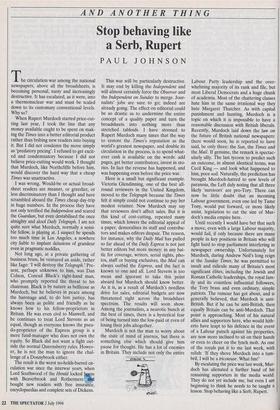people more than other people . . .. Lusting for
fame . . . he was aware of his brain as an aggressive weapon.
And finally here is Professor Weight- man's speculation about that:
He liked the effect he could have on other
Brian Masters
SHOT IN THE HEART by Mikal Gilmore Viking, £16, pp. 403 Three years ago I read in Granta a remarkable essay by the brother of Gary Gilmore, the convicted murderer who begged to face the firing-squad in 1977 and was afterwards the subject of Mailer's Executioner's Song. It was the first time one had heard the voice of somebody related to, not a victim, but the killer himself, and it was written with spare eloquence and a quiet pain which earned respect. That essay has now grown into a worthy book whose impact is hard to describe; it creates a kind of discomfort in the reader, as the intimate tale of squalid family life leads him towards a conclusion he would rather resist, namely pity for a man who has behaved with blunt wickedness.
This book tells the story of all the Gilmores, Frank and Bessie and their four sons, as seen by the youngest of them, a man of sharp, uncompromising honesty. He talks of 'a darkness in the marrow of our history', of a family doomed to cruelty and hatred and bound ultimately to wreak destruction. Mikal Gilmore is a gentle man, one who despises the notion of state execu- tion (`people gathered together to put a man to death'), and is revolted by the act of murder. Yet one of his brothers was at the centre of both events, and Gilmore does not shrink from the implication that he carries many of the same genes and might have lurking within him something of the same character. He has spent nearly 20 years trying to escape from the family curse, wanting to 'feel like a good person
mon frere
After the psychobiographers have done their work on Robert Maxwell, perhaps they might be encouraged to move on to Jean-Paul Sartre.
again', but it meant denying the love he had felt for his closest kin, and thereby denying himself. His book is very much a testament, intensely personal and dignified. Like Lionel Dahmer, who has faced the terrible truth that he might have been capable of his son Jeffrey's crimes, at least as far as personality is concerned, Mikal Gilmore concludes that it would have been better had his parents had no children at all.
All that separates a baby's face from a killer's, he writes, is a history of destruc- tion. There was not one moment which turned Gary into a dangerous man, but a whole sequence of them, a collision and fusion of harmful influences. Father Frank left his infant son on a park bench while he went to cash a dud cheque. Gary had to be reclaimed from an orphanage, while his father went to prison. Frank was frequently drunk, always cruel and vicious to the kids, punching them in the stomach, strapping them mercilessly for the slightest infringe- ment of his rules, trying to beat them into loving him. Gary was the most vulnerable, crying at the injustice of it, which made Because this is a family saga, and because the author is scrupulous in avoid- ing bias, there are surprisingly tender moments, as when Gary implores Mikal to `be a man' and put up with the beatings rather than resent them and end up like him. Frank and Bessie holding hands despite years of torment and ruin is anoth- er simple scene, and Frank's bursting into tears at what was discovered in Auschwitz in 1945 a worthwhile reminder of the prismatic complexity of us all. Mikal loved his father, and felt guilty that his father should love him even as he was beating the others. He loved Gary, and felt guilty that this love was greater than his pity for Gary's two innocent victims. His book is an attempt to assuage that guilt, to break free and breathe unpolluted air.
It gives one pause, for its unremitting candour deflects facile condemnation, and one is bound to doubt whether his broth- er's crimes could ever allow the author that ordinary contentment which we all expect. Gilmore has made a career writing about pop music, but his style here has a deeper resonance, that of a perplexed intelligence. His mother, too, seems to have been blessed with the power of simple words. Describing Gary's execution in Utah, she said, 'They shot your brother's heart out, onto the ground.'
" • 0, C3.


























































 Previous page
Previous page